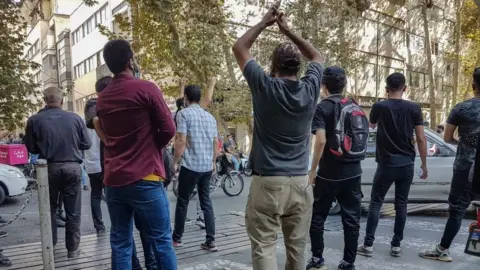Iran protester: 'You know that you might never come back'
 EPA
EPAProtests in Iran are continuing despite a crackdown by security forces that one human rights group says has killed at least 201 people. The unrest erupted in response to the death in custody of Mahsa Amini, a 22-year-old woman detained by the morality police for allegedly breaking the strict hijab rules.
There are heavy restrictions on independent and foreign reporting in the country. But the BBC Today programme's Nick Robinson was able to interview Fawaz - not his real name - who has been protesting on the streets in Tehran.

The atmosphere is quite tense and yet it is exciting. People are hopeful this time and we hope that a real change is just around the corner. I don't think people are willing to give up this time. Now, we are seeing women in the street who are not wearing a hijab. They are walking past and people are quite supportive. Drivers in the street honk whenever they see a woman is not covered up. They don't cover up their heads.
Usually, the protests start in the evening, in the afternoon. And they are in different locations in a city, so people do not just gather round in one specific area. If you just go out, you can hear cars honking. In some parts, people are out in the street. They are protesting against the security forces. And at night, the people who do not want to leave their houses are shouting slogans like "down with the dictator" out of their windows. You can hear some sort of protest everywhere, almost every night. That feels good, that feels really good.
Nick Robinson: What sort of people are joining the protests?
Everyone. The prominent figures in this are actually the women. They are to some extent leading this. Their rights are part of human rights. That is why some people might call it a feminist movement. But what is setting this apart is the inclusion of minorities and the women at the front. And it's widespread. It is not just in big cities. It is in smaller cities.
NR: When you confront the security forces, how are they reacting?
When you take to the streets you should expect anything. Deep down, you know that you might never come back. You might get arrested, detained for days, months or even years, as we have seen before. So far, I have been lucky. I have been beaten with a baton [by security forces], I have been kicked. But I have seen worse. The situation is quite stressful, but it is quite hopeful as well. It is stressful because you never know whether the person standing next to you is a member of the security forces. And yet it is hopeful because you can see that your voice is finally being heard, especially this time on an international level, despite all the [internet] filtering that is going on in Iran.
NR: You go out on the streets knowing, in your words, that "you might never come back". This is something you are prepared to die for?
Yes.
NR: Why?
Somewhere, at one time, for this to end we need to do something. We should accept the challenges and the facts as well. If we want to say something, we know that we are going to give something for it as well, sometimes with our lives.
NR: For you, is this a protest about whether women wear the hijab? Or is it something much bigger than that?
It is about something much bigger than that. If you look at the slogans at the protests, what people are saying on the streets, it has never been - even at the beginning - about the hijab. The hijab was just the spark. It has always been about basic human rights. We've always wanted more. We've wanted what you might take for granted as a normal life. We want life, liberty, justice, accountability, freedom of choice and assembly, a free press. We want access to our basic human rights and an inclusive government that is actually elected by the people through a proper election and that works for the people.
NR: We are not using your real name for this interview. Are you taking a risk speaking to the BBC?
Yes, it's a great risk because it is considered a crime in Iran if you speak to foreign news broadcasts. You might easily get arrested, punished, imprisoned. The consequences are severe.
NR: Do you have hope that the change that you so desperately want might happen this time?
Hope is all we have and I am willing to stick to it. I hope at least our voices will be heard. That's all I can say about this.

What do you want to know about Iran and the protests there? The BBC's chief international correspondent Lyse Doucet and BBC Persian reporters will answer your questions on Friday in special live coverage on the BBC website.
You can send questions you'd like to put to them in the following ways:
- Email [email protected]
- WhatsApp: +44 7756 165803
- Tweet: @BBC_HaveYourSay
In some cases your question will be published, displaying your name, age and location as you provide it, unless you state otherwise. Your contact details will never be published. Please ensure you have read our terms & conditions and privacy policy.
You can also use this form to ask your question:
If you are reading this page and can't see the form you will need to visit the mobile version of the BBC website to submit your question or send them via email to [email protected]. Please include your name, age and location with any question you send in.
